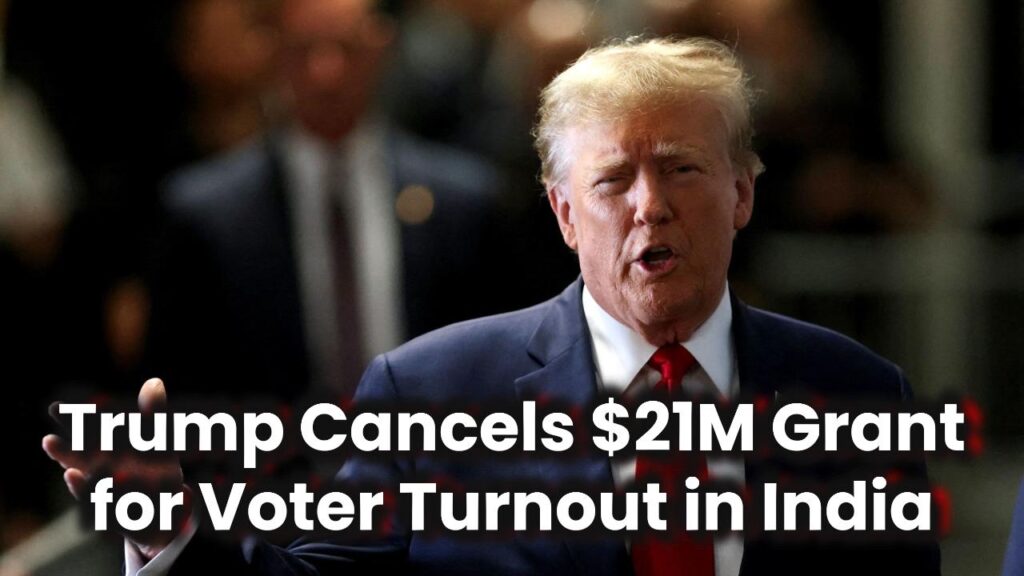
Trump Cancels $21M Grant for Voter Turnout in India: The recent decision by former U.S. President Donald Trump to cancel a $21 million grant aimed at boosting voter turnout in India has sparked widespread debate. This move has raised questions about the role of international funding in domestic elections, the implications for U.S.-India relations, and the broader effects on democracy worldwide.
Trump Cancels $21M Grant for Voter Turnout in India
| Topic | Details |
|---|---|
| Decision | U.S. canceled $21 million funding for voter turnout programs in India. |
| Reasoning | Trump questioned the necessity of U.S. taxpayer money funding foreign elections. |
| Reactions in India | BJP welcomed the move, citing sovereignty; Congress demanded an investigation. |
| Broader Context | Similar cuts to programs in Bangladesh and Nepal. |
| Impact on U.S.-India Relations | Could influence diplomatic ties and future funding programs. |
| Sources | Times of India, Hindustan Times, The Independent |
The cancellation of the $21 million grant for voter turnout programs in India is a politically charged decision with both domestic and international implications. While it raises concerns about funding for voter education, it also highlights India’s commitment to electoral sovereignty. The move is part of a larger U.S. policy shift to reduce foreign aid expenditures.
For India, the focus now should be on self-sustained voter participation programs, leveraging government initiatives, corporate sponsorships, and digital tools to ensure a strong democratic process.
Why Was the $21M Grant Canceled?
The U.S. Department of Government Efficiency (DOGE), under the Trump administration, announced the termination of multiple international programs. One of the most debated cuts was the $21 million grant for voter participation efforts in India. Trump defended this move, stating:
“Why are we giving $21 million to India? They have a lot more money. They are one of the highest taxing countries in the world in terms of us; we can hardly get in there because their tariffs are so high.”
This cancellation is part of a broader strategy to reduce foreign aid and prioritize domestic spending. Similar programs in Bangladesh ($29 million) and Nepal ($39 million) were also revoked.
Reactions to the Decision
1. Indian Government’s Stance
- BJP (Ruling Party): The Bharatiya Janata Party (BJP) supported the decision, with IT Cell head Amit Malviya calling it a “necessary step to prevent foreign interference in India’s electoral process.”
- Election Commission of India (ECI): While the ECI has not made an official statement, sources suggest that India’s electoral body prefers self-sufficiency in managing elections.
2. Opposition’s Response
- Congress Party: Senior leader Ajay Maken demanded an investigation into the matter, stating that “any form of foreign intervention in India’s democracy is unacceptable.”
- Civil Society Organizations: Some non-profits that promote voter awareness and democratic participation criticized the move, citing concerns over declining voter engagement in marginalized communities.
How Does This Affect India’s Electoral Process?
1. Funding for Voter Education
The $21 million grant was primarily meant for educational campaigns to improve voter awareness and turnout, particularly in rural and low-literacy regions. Without this funding, grassroots organizations may struggle to continue their programs.
2. Impact on India-U.S. Relations
While India has not formally requested such funding, the cancellation signals a shift in U.S. foreign aid policy. This could impact future collaborations between the two nations.
3. Sovereignty vs. External Influence
The decision has reignited debates on electoral sovereignty. Should a sovereign nation accept foreign funds for voter participation? Some argue that external funding could create dependencies or hidden political influence.
Possible Political and Economic Implications
1. Strain on Diplomatic Ties
- India and the U.S. have enjoyed strong diplomatic relations, but this decision might cause tensions.
- Future economic negotiations could be influenced by the way this funding issue is handled.
2. Potential Shifts in India’s Foreign Policy
- The move may push India to explore alternative international partnerships.
- Increased collaborations with European and Asian nations for electoral reforms and voter outreach programs.
3. Domestic Electoral Reforms
- The Election Commission of India might push for additional domestic funding for voter awareness programs.
- NGOs may seek corporate social responsibility (CSR) funding to maintain their operations.
What Are the Alternatives?
1. Increased Domestic Funding
The Indian government could allocate more resources for voter awareness programs through the Election Commission.
2. Corporate and NGO Partnerships
Private sector funding and NGO-led initiatives could help bridge the gap left by the absence of U.S. aid.
3. Leveraging Technology
India’s digital infrastructure, including platforms like MyGov and e-Vidhan, can be used for cost-effective voter outreach campaigns.
FAQs
1. Why was the U.S. funding voter turnout programs in India?
The grant was part of broader U.S. initiatives to support global democratic participation.
2. Does India rely on foreign aid for elections?
No. India conducts self-funded elections but benefits from international best practices.
3. Will this affect the 2024 Indian elections?
Unlikely. The Election Commission has robust infrastructure to handle voter awareness efforts.
4. Could this impact India-U.S. diplomatic ties?
While not a major issue, it reflects shifting U.S. priorities, which may influence future funding decisions.







